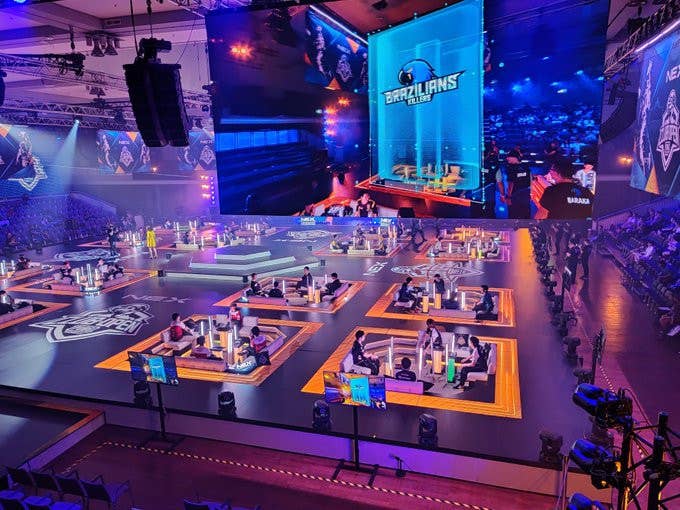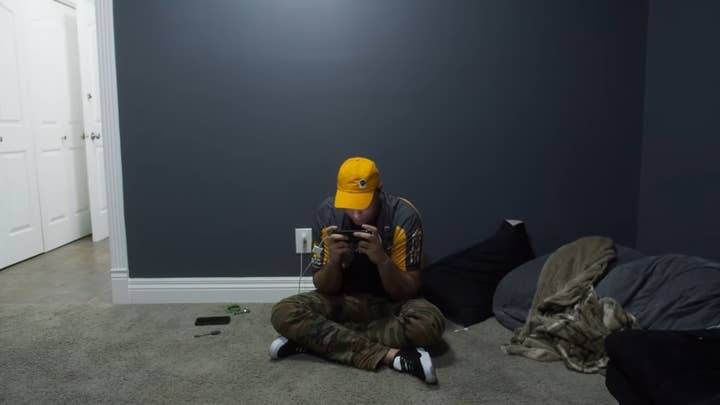PUBG Mobile envisions esports for casuals
Tencent Games' Neo Liu discusses the company's efforts to build high- and low-end competitive scenes around its mobile survival shooter
Neo Liu leads Tencent Games' North American publishing team, and while there are other projects on his plate and things planned for the future, right now his focus is on PUBG Mobile and growing the game's profile as an esport.
Needless to say, there are some challenges with that proposition. When Liu speaks with GamesIndustry.biz about those challenges, he readily acknowledges some of the hurdles in front of him. For one thing, the field of "mobile esports" is even less developed than PC and console esports in North America.
"In the US or the North American market, console and PC are still dominating," Liu says. "A lot of players use these devices, but the trend with mobile users is increasing and especially as more people have affordable mobile devices, more people will want to enjoy games on them."
He likens the situation to what happened in China earlier this decade, when mobile esports were just starting to gain traction. At the time, Liu says people didn't really take mobile esports seriously for similar reasons, but, "they eventually figured out mobile esports is something real, something capable of being accepted by a wider audience. But the way it's viewed through the public is a little different from the traditional console or PC esports, because people are more casual."

Mobile esports tend to be faster paced, he says, and serve slightly different tastes for the audience. Just like some people might watch feature-length movies on their TV while others binge reality TV shows and "quick-consumption content," Liu says there's potential for user behavior to produce similarly segmented audience categories in the North American esports market.
But if mobile esports are targeting a casual market, is there any problem getting those casual audiences to be hardcore enough about the game to practice their skills and join organized tournaments? Liu doesn't think so, because Tencent isn't really trying to do that.
"We're not trying to pressure them to be pro gamers... The top players are at the very top, but we need a foundation for that where more people can join into and enjoy events"
"We don't think we're advocating users to be more hardcore," Liu says. "It's not necessary for them to play two hours every day and need to keep grinding their skills to be pro gamers. We just want them to enjoy the game and the esports content, to keep a good, healthy ecosystem around the game... We're not trying to pressure them to be pro gamers, because like any sport, it's always a pyramid. The top players are at the very top, but we need a foundation for that where more people can join into and enjoy events."
That's why Tencent has taken to cultivating both the competitive and casual ends of the PUBG Mobile esports spectrum. The PUBG Mobile Club Open and PUBG Mobile Star Challenge represent the game's pro pinnacles and largest prize pools (the 2018 Star Challenge had a $600,000 prize pool, while the year-long 2019 PMCO prize pool is $2.5 million), while Tencent is also working to encourage lower stakes competitive events around the game for more casual players to enjoy.
For example, it partnered with amateur esports event promoter Super League to help foster local PUBG Mobile community events around the US, and in August it ran one-night tournaments at seven GameWorks locations where players were competing to win the game's canonical reward for victory, a chicken dinner.
Liu says it's important to foster a pro scene in an esport and added that Tencent is looking to train and cultivate star players "to be like role models" -- he mentions the impact Steph Curry has had on the NBA as one example of how high-profile players can boost the entire sport -- but notes that the dream of turning pro doesn't need to be shared by everyone who plays.
"We're not trying to pressure them to be pro gamers, because like any sport, it's always a pyramid," Liu says. "The top players are at the very top, but we need a foundation for that where more people can join into and enjoy events.

Tencent is pushing PUBG Mobile esports events worldwide, but so far Liu notes that push has been most effective in emerging markets.
"In order to promote esports games in North America, the cost can be much higher compared with emerging markets, especially for an offline event," Liu says. "The marketing cost is much higher over here, so that's why we're working with partners like Super League, ESL, and GameWorks."
Those partnerships are particularly important for Tencent, as Liu points to the benefit the "physical presence" of an actual local event can be compared to an online tournament.
"We all know esports can be played online, but when it's played offline, when people can experience and watch others playing it, it's a different context," Liu says. "The feeling is totally different."
We point out that the places where mobile esports have done well include emerging markets and China, places where the game scenes don't have traditional console histories equivalent to other established markets. When we ask if there's a causal relationship there, Liu says yes and no. In China particularly, he notes that previous generations did grow up with consoles from about the NES through the Dreamcast eras, but adds that the PC is still a popular platform. He instead points to a cultural embrace of mobile devices for virtually everything as a bigger driver of mobile esports success there.
"Profitability is not our highest priority. We want to build an ecosystem to support the game itself, rather than wanting to make money from esports"
"In China, it's not just gaming on mobile; everything's around mobile," Liu says. "You can order a taxi or make a reservation with your doctor on mobile. People's user behaviors are on mobile. That's why it might be easier to establish mobile esports in China. Meanwhile, esports overall are quite popular in China. We can see most of the traffic for League of Legends esports comes from East Asia."
PUBG Mobile is also quite popular in China, even though the game isn't technically released there. After a year of waiting for approval from the Chinese government to officially launch PUBG Mobile in China, Tencent dropped its plans and released Peacekeeper Elite, which is essentially a reskinned version of the game more palatable to government regulators.
Regardless, PUBG Mobile tournaments are still open to China, and Liu says it produces many of the game's top players. (For example, China's Top Esports won the grand prize in the PUBG Mobile Club Open Spring Split Global Finals.) Tencent is still working to reconcile the relationship between Peacekeeper Elite and PUBG Mobile, but fundamentally Liu says the gameplay is the same. He likens it to the Chinese version of League of Legends, which has a different UI and some different art, but ultimately is the same game other markets play.
As for how Tencent views the payoff for its PUBG Mobile esports push, Liu says its ultimate success or failure will be measured by engagement, both in terms of the people playing PUBG Mobile esports and the people watching them.
"Profitability is not our highest priority," Liu says. "We want to build an ecosystem to support the game itself, rather than wanting to make money from esports. I don't think any esport in the world, including DOTA or League of Legends, are really trying to make money from that. If you're making money sacrificing people's experience or trying to sell items through the esport, that doesn't work. People all know that.
"But we do see the potential in the future for monetization. We try to learn a lot from traditional sports events. Eventually the fans become very loyal and can pay money for what they want, whether it's the content or supporting their favorite players, access to certain content in the esports, sponsorship, or live broadcasting rights... all can be our future revenue, but right now we're not looking at that."
The PUBG Mobile Club Open Fall Split North American semifinals are set for this weekend, with the six regional final competitions kicking off later in the month. The Global Finals will take place November 29 through December 1 in Kuala Lumpur, Malaysia.
